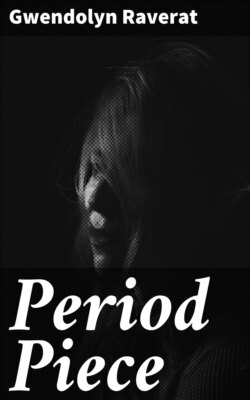Читать книгу Period Piece - Gwendolyn Raverat - Страница 4
На сайте Литреса книга снята с продажи.
Prelude
ОглавлениеTable of Contents
In the spring of 1883 my mother, Maud Du Puy, came from America to spend the summer in Cambridge with her aunt, Mrs. Jebb. She was nearly twenty-two, and had never been abroad before; pretty, affectionate, self-willed, and sociable; but not at all a flirt. Indeed her sisters considered her rather stiff with young men. She was very fresh and innocent, something of a Puritan, and with her strong character, was clearly destined for matriarchy.
The Jebbs, my great-uncle Dick, and my great-aunt Cara, lived at Springfield, at the southern end of the Backs, and their house looked across Queens' Green to the elms behind Queens' College. Uncle Dick was later to be Sir Richard Jebb, O.M., M.P., Professor of Greek at Cambridge, and all the rest of it; but, at that time, he held the chair of Greek at Glasgow, and so had been obliged to resign his Trinity fellowship and the post of Public Orator at Cambridge. However the Jebbs spent only the winters in Glasgow, and kept on their Cambridge house for the summers, while they waited hopefully for old Dr. Kennedy to retire, so that Uncle Dick might succeed him in the Cambridge Professorship. This was the Dr. Kennedy who wrote the Latin Grammar, which we all knew very well in our youth, and he had not the slightest intention of retiring; neither was it by any means so certain as the Jebbs chose to consider it, that the succession would fall to Uncle Dick. However, after keeping them waiting for thirteen years, Dr. Kennedy died in 1889, and Uncle Dick came into his kingdom at last.
The earliest Cambridge that I can remember must have been seen by me in reflection from my mother's mind, for it is the same picture as that which she draws in a series of artless letters, written to her family in Philadelphia in this summer of 1883, two years before I was born. In this, the first Cambridge in the mirror of my mind, the sun is always shining, and there are always ladies and gentlemen sitting in the garden under the trees, very much occupied with each other. It was quite a different Cambridge which I saw later on, when I looked at it with my own eyes.
My mother had fallen into a world which was very strange to her. She wrote home: 'I am at last at the Utopia of all my fondest dreams.' It was a Utopia of tea-parties, dinner-parties, boat-races, lawn-tennis, antique shops, picnics, new bonnets, charming young men, delicious food and perfect servants; and it almost seems too good to be true. I suppose there must have been some difficulties, even in those days; and indeed all the right sleeves of my mother's dresses would keep on getting too tight, from the constant tennis; and the helpings of ice-cream were far too small for an American; but, otherwise, you would really think, from the letters, that Unrequited Love—other people's Unrequited Love—was the only serious trouble. And even the broken hearts of which we are told seem to have been very quickly mended.
The Du Puys were of a good family of Huguenot descent; but they were not well off. There were many children, and Maud could not possibly have accepted her aunt's invitation, if her fare to England had not been paid by her elder brother. He was now getting on well, and was generous to his sisters. The girls had been sent to fairly good schools; but in the case of my mother at any rate, Education, like an unsuccessful vaccination, had not taken very well. It was not a question of schooling, but of temperament. But my mother arrived in England with a great respect for culture, and eager to learn all she could. We find her struggling to read Browning and Tennyson and Shelley; battering her way with pride and tenacity through La Petite Fadette, and preaching the virtues of learning French to her younger sisters. But with all her respect for education—and no one could respect it more—learning was never her strong point. However, she got on perfectly well without it.
